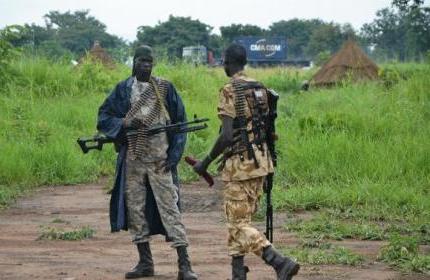South Sudan army accused of raiding SPLA-IO cantonment area in Mundri
November 25, 2015 (ADDIS ABABA) – South Sudan army (SPLA) stands accused of carrying out air raids on Tuesday on cantonment area of the armed opposition faction of the Sudan People’s Liberation Movement (SPLM-IO) in Mundri county of Western Equatoria state.

“The regime in Juba on Tuesday unleashed helicopter gunships and attacked our designated cantonment area in Mundri county,” armed opposition leader’s spokesman, James Gatdet Dak, said in a statement he issued on Wednesday.
He said the action was a violation of the ceasefire deal and the security arrangements the two parties signed this month in the Ethiopian capital, Addis Ababa.
Dak charged that the attack on the cantonment area was an indication that president Kiir’s government was not committed to the implementation of the peace agreement.
Other government sources told Sudan Tribune that the government was prompted to attack the area after it received information that the opposition leader, Machar, was being airlifted by a United Nations aircraft to visit Mundri and that he was the target in the attack.
The two parties in the security arrangement’s agreement would establish cantonment areas for their forces before a process of reunification of their rival armies can take place and may last for 18 months.
JUBA NOT FOR PEACE
In a separate development, a high ranking South Sudanese rebel commander warned on Wednesday that the country would witness a full scale armed conflict after the main warring parties signed a peace deal in August, accusing the government of renewed offensive on their positions in Upper Nile state.
.
The renewed violence involving fighters of the rival sides and the formation of new rebel groups against the 28 states proposed by president Kiir have dampened any lingering hopes of the commitment of the two sides to implement peace.
“There can never be peace when there is an onslaught of terror. The government forces are on offensive. They are ever coming out to attack and make a wild claim pointing fingers at others and nobody comes out from the international community to condemn and hold this government responsible for her actions,” a senior rebel commander told Sudan Tribune during an interview on Wednesday.
General Johannes Okij, an overall commander of the tiger forces predominantly members of ethnic Shilluk based in Upper Nile state, said his group welcomed the formation of new rebel faction in Western Equatoria state, pledging support and readiness to help remove from power president Salva Kiir.
“We welcome the heroic and patriotic decision taken by our brothers and sisters in Western Equatoria to join the flock of liberation struggle. That man, that monster must not be allowed to drive the country to the pitch at our watch, it cannot happen,” said Okij in reference to president Kiir.”
“He will have to do that on our dead bodies,” he said.
The rebel commander who is yet to declare whether he would join his forces with armed opposition forces allied to the former vice president, Riek Machar, in the area under the overall command of General Johnson Olony, said during an exclusive interview with Sudan Tribune on Wednesday that any attempt by the government to force the people to think the same would be resisted.
He said the recent unilateral decision by president Kiir to create 28 states by grabbing other communities’ lands and giving them to his ethnic Dinka community will be resisted.
“Deciding on a system of governance can never be imposed. It is not a mechanical exercise but it will require judgements based on consensus and the willingness to engage and listen to others,” he said.
“If you want me to live with you, then listen to me and get what I want to say. If you do that I think we can probably begin to dialogue. But if you think you can make me think and behave like you, then forget it.”
(ST)
